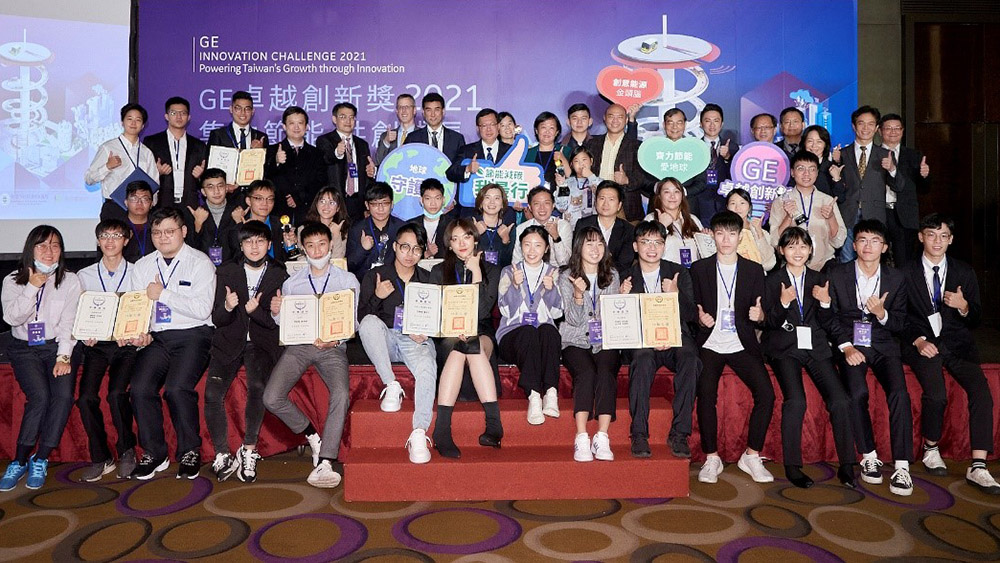Pictured at right: representatives from GE, TPC, and TCG with the challenge winners. Masking is not required for certain activities (e.g., when taking photos) as per local regulations.
Overview
Rewarding new ideas for solutions that will help Taiwan reduce power consumption—and grow a generation of energy-minded global citizens
The challenge
Ranking 57 among 61 countries in the Climate Change Performance Index 2021, Taiwan is reaching higher to offset greenhouse gases and integrate renewables.
The solution
In partnership with Taoyuan City Government (TCG) and Taiwan Power Company (TPC), GE awarded over NT$1 million to winning innovations for smarter electricity and decarbonization.
The objective
Competitively lighting the way
What exactly is GE’s Innovation Challenge? In collaboration with TCG and TPC, this healthy competition’s objective was to crowdsource new approaches to decarbonizing power and reducing energy consumption for the island of Taiwan.
While a first in Asia, the contest was an open invitation beyond the Taiwan’s four walls. Industry experts, higher-education students, youth from Taiwan, and youth from abroad answered the call. Selected teams fell into two categories: elite groups and student groups. Ultimately, 10 teams from each group competed, but only six would place in the finals.
The teams
Building a global energy community
The chance to strut sustainability ingenuity attracted 116 entries. It was a tall order, but GE and Taoyuan City Government wanted to see who in the world could best conceive of a cleaner, environment-friendly system to balance the island’s grid—and plant more seeds for Taiwan’s circular economy.
Evaluation
Quickly meeting grading standards
Prepared with just a few briefing sessions and online workshops, the teams developed solutions that would be ranked according to the following rubric.
25%
anticipated impact
20%
practicality
20%
sustainability
15%
scalability
15%
innovation
The 10 finalists from both student and elite categories advanced to the final round, presenting ideas to a panel of judges from GE, TPC, TCG, Chung Yuan Christian University, and Chien Hsin University of Science and Technology.
How to win
Winners granted cash prizes to further their ideas
First place winner received NT$250,000; second place NT$150,000; and third place NT$100,000. In addition, a special prize of NT$10,000 was awarded to 10 chosen students.
Outcomes
When talent and ingenuity intersect
GE’s Innovation Challenge with us was a widely supported idea. We expect it will result in bright energy solutions, and also encourage coming generations to care more about energy issues like Taiwan’s. Let’s create a better future for this beautiful island.
Chung Bin-li
President, Taiwan Power Company
Taoyuan City is expanding its renewables with an energy transformation based on coal reduction, liquid natural gas increase, and non-nuclear energy. This new energy mix is aimed at success by 2025 but has been bolstered by the Innovation Challenge’s collective ingenuity.
GE’s been playing an important role in supporting the development of Taiwan since 1961 via the domains of Healthcare, Aviation, and Power businesses. With GE having started the challenge, GE Gas Power Asia President and CEO, Ramesh Singaram, is proud to say, “We’ve seen ideas that can push Taiwan’s decarbonization. I’m impressed by the quality of talent, because every contestant displayed a level of innovation that will be key in steering us toward a low-carbon future."

